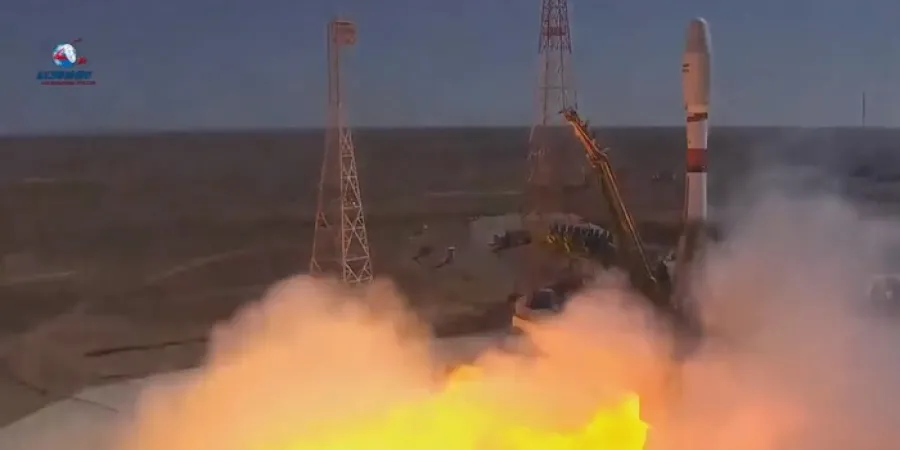West concerned over Russia-launched Iranian satellite
US officials are concerned that the satellite will provide Iran with advanced capabilities to monitor Israel and other targets, and that it will help Russia’s war on Ukraine, says the Washington Post
Mandi Kogosowski
| 09/08/2022
Russia launched an Iranian satellite into orbit from southern Kazakhstan yesterday (Tuesday), and the latter has already obtained initial data including telemetry measurements, received by ground stations of the Iranian Space Agency.
Iranian news agency IRNA and Russian news agency TASS reported that the satellite, Khayyam (named after the Persian poet and philosopher Omar Khayyam from the 11th century), was launched atop a Russian Soyuz-2.1b carrier rocket from the Baikonur spaceport.
“The Iranian satellite is designed to conduct scientific research, test inter-satellite communications channels technology, measure the level of electromagnetic radiation, carry out Earth’s remote probing and environmental monitoring,” says the official TASS announcement.
Of course, the West finds it hard to believe that Iran’s goals are that innocent. Last week, the Washington Post reported concerns by US officials over the Moscow-Tehran cooperation, who are worried that this satellite will help Russia in Ukraine and also provide Iran with new, advanced capabilities to monitor Israel and other targets in the Middle East.
The newspaper quoted anonymous Western intelligence officials who claimed that Russia plans to use the satellite “for months or longer” to aid its war efforts in Ukraine.
Tehran, however, has rejected such claims. In a statement released this Sunday, the Iranian Space Agency said the satellite will be fully controlled by Iranian experts and technicians “from the first day” of its launch.
“No other country will have access to such information, and rumors about using satellite images for another country's military purposes are false,” the agency added, as published in the Tehran Times.
As Russia becomes increasingly isolated from the West, cooperation between Moscow and Tehran is expanding. In July, Russian President Vladimir Putin visited Iran on his first international trip since the start of Russia's military campaign in Ukraine, and met with Supreme Leader Ayatollah Ali Khamenei.
Both countries have recently signed documents to expand cooperation in the fields of communications and information technology. In May, the Iran-Russia Joint Technology Center was established at the St. Petersburg Polytechnic University with the aim of “implementing joint projects and developing bilateral technological cooperation.”
US officials are concerned that the satellite will provide Iran with advanced capabilities to monitor Israel and other targets, and that it will help Russia’s war on Ukraine, says the Washington Post
Russia launched an Iranian satellite into orbit from southern Kazakhstan yesterday (Tuesday), and the latter has already obtained initial data including telemetry measurements, received by ground stations of the Iranian Space Agency.
Iranian news agency IRNA and Russian news agency TASS reported that the satellite, Khayyam (named after the Persian poet and philosopher Omar Khayyam from the 11th century), was launched atop a Russian Soyuz-2.1b carrier rocket from the Baikonur spaceport.
“The Iranian satellite is designed to conduct scientific research, test inter-satellite communications channels technology, measure the level of electromagnetic radiation, carry out Earth’s remote probing and environmental monitoring,” says the official TASS announcement.
Of course, the West finds it hard to believe that Iran’s goals are that innocent. Last week, the Washington Post reported concerns by US officials over the Moscow-Tehran cooperation, who are worried that this satellite will help Russia in Ukraine and also provide Iran with new, advanced capabilities to monitor Israel and other targets in the Middle East.
The newspaper quoted anonymous Western intelligence officials who claimed that Russia plans to use the satellite “for months or longer” to aid its war efforts in Ukraine.
Tehran, however, has rejected such claims. In a statement released this Sunday, the Iranian Space Agency said the satellite will be fully controlled by Iranian experts and technicians “from the first day” of its launch.
“No other country will have access to such information, and rumors about using satellite images for another country's military purposes are false,” the agency added, as published in the Tehran Times.
As Russia becomes increasingly isolated from the West, cooperation between Moscow and Tehran is expanding. In July, Russian President Vladimir Putin visited Iran on his first international trip since the start of Russia's military campaign in Ukraine, and met with Supreme Leader Ayatollah Ali Khamenei.
Both countries have recently signed documents to expand cooperation in the fields of communications and information technology. In May, the Iran-Russia Joint Technology Center was established at the St. Petersburg Polytechnic University with the aim of “implementing joint projects and developing bilateral technological cooperation.”



